UK Education Sector Procurement Report
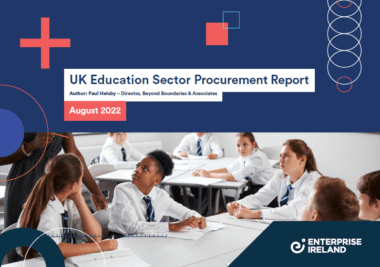

The 20×20 campaign to promote the visibility of women in sport was a resounding success in 2020 – and the tagline, “If she can’t see it, she can’t be it”, is just as applicable to women in other areas of life, including the business world. The Level Project, from Enterprise Ireland, aims to increase the number of women in leadership in all sectors, recognising that women in senior management are effective role models for female employees coming through the ranks – proving, in effect, that leadership is just as much an option for women as it is for anybody else who works hard and has that ambition.
A company that has proved that for many years is CLS, Ireland’s largest contract laboratory, which supplies microbiological and analytical testing and trained lab anlaysts on contract to the food, environmental, pharma and MedTech industries. The company was founded by Evelyn O’Toole in 1994, a then 25-year-old environmental graduate who had worked two and a half years in industry before losing her job suddenly thanks to a fire. Because jobs were scarce in the West of Ireland at that time, she decided to go it alone.
“I didn’t really have any fear because I was oblivious to risk,” explains Evelyn. “From the start it was about surrounding myself with people, so my knowledge could be bolstered by theirs. My aim was to create a job for myself, to design my own future and be able to live in the West of Ireland. The other part was to build a platform where others with the same vision could come and join me.”
Evelyn proved incredibly successful in her endeavours – CLS now has 235 employees, and this year has a turnover in excess of €23 million. They are now the go-to company for multinational companies that want the help of skilled analysts to set up and keep them safe; the company also has FDA approval, allowing them to test products for the US market. Currently, they have a presence on 18 sites across Ireland, along with their own premises in Ros Muc and Galway City.
Striving for gender balance has come naturally for Evelyn as a female CEO, but rather than a political issue, she regards it as vital for a healthy business environment. “I have always aimed for harmony as I just think it’s natural, that we should treat everyone with respect, regardless of who they are. If everyone does their job really well, it makes us very solid as a company.”
In fact, this visibility proved so successful that CLS now has 59% female staff. “We’ve actually had an inverse of the gender balance issue, in that we’ve had to go and tap men on the shoulder and encourage them to go for lead-level roles and stay with us.
“I think if you start a trend at the start of a company, that trend intensifies as the company gets bigger. As CEO, I need to make sure that gender diversity is there by bringing the men along with us, to ensure we have that good mix in the company. If there’s skill, performance and ambition, then it’s about nurturing that and kicking the door open.”
While CLS is enjoying an abundance of female talent, many other companies can’t say the same. “There’s a groundswell of women emerging in leadership roles, especially in pharma and MedTech,” says Evelyn. “Many women naturally go for caring roles but if you are working in something like medTech, you are having a big impact on people in the same way as those in frontline caring, as you are creating products that will have an impact on hundreds and thousands of people.
“That said, Ireland is still behind when it comes to women in leadership and senior management roles and we have to find out why – if it’s lifestyle, flexibility, confidence, opportunity or even money – from my own observation, women are less inclined than men to look for pay rises so it’s important to have a system in which they won’t be left behind in terms of money.”
That confidence can be gained by seeing women achieve their ambitions, and more – and there’s no better role model than Evelyn herself. In fact, women all over Ireland were able to gain from Evelyn’s positive message in 2017 when she won the Industry EY Entrepreneur of the Year, the first woman to win the Industry award since they began in 1997.
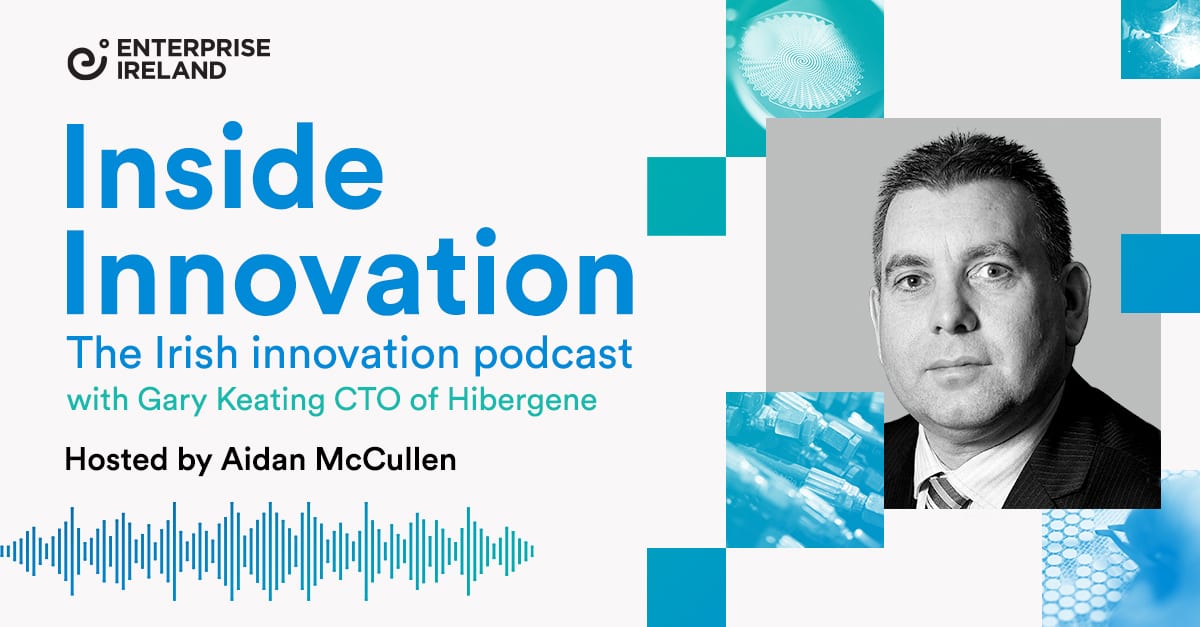
As an island nation, the export economy is essential for the health and growth of Irish companies. Our reputation for innovation and entrepreneurship has served us well in that regard, with Irish companies finding huge success in every corner of the world. Key markets such as the UK, the US, France and Germany remain hugely important, but ambitious Irish exporters are exploring other countries that are actively looking for the products and solutions produced by Irish entrepreneurs – and finding a whole new world of opportunity. A region that is growing rapidly in importance for Irish business is the Nordics, an area made up of Sweden, Denmark, Norway, Finland, and Iceland.
Currently, over 450 Enterprise Ireland supported companies export to the Nordics, with exports reaching a remarkable €1.16 billion in 2020. It’s easy to see why this region is so attractive, home to 26 million inhabitants, the Nordic region is the 11th largest economy in the world.
Irish companies have a strong track record and reputation here, says Eoghan O’Connor, Market Executive, ICT & Start Ups, Enterprise Ireland. “The Nordics are known for being progressive, stable, and open to new technology.”
This innovation can be seen in the number of household names from the Nordics. For instance, within the Nordic ecosystem are global companies like H&M, Nokia, Volvo, Maersk, and Ericsson. In addition, outside of Silicon Valley, the Nordics have generated the highest number of unicorns per capita globally, including companies like Spotify, Mojang (creators of Minecraft), Oatly, and Klarna.
“The success of these companies is down to the ecosystem, which is a fertile ground for innovation and entrepreneurship,” explains Eoghan. “Their comprehensive welfare state provides citizens with free education, healthcare, and social security and their public sector provides a strong framework for the ecosystem with opportunities for funding and other supports. There is also a dedicated focus on R&D and in general they are a population of early adopters of new technology.”
Already there are several very successful Irish companies in the region, all of which offer clever solutions in several different areas. “These include WAZP, an Enterprise Ireland High Potential Start-Up (HPSU) that specialises in the production of 3D printing materials, which has forged a partnership with IKEA, one of the most globally recognised brands,” says Eoghan.
“In addition, iCabbi, a Dublin cloud-based taxi firm, have a contract with Finnish taxi company Meneva, which has grown its fleet from 100 cars to over 1,500 since joining iCabbi over two years ago.”
A key term in today’s global business world is sustainability, a significant area of growth as we race towards ambitious goals of net zero emissions. The Nordic countries have been long considered leaders in this field, especially in the area of environmentally friendly transport options, such as public scooter schemes.
“Irish companies are playing their part here also,” says Eoghan. “For instance, Luna Technologies, which develops AI tech for the e-scooter market, has partnered with Swedish scooter giant Voi, while Zeus has rolled out scooters in Oslo, Halmstad, and Karlstad.”
These Irish companies have found huge success in the region – but there’s plenty more opportunity for ambitious Irish exporters who will find an open and welcoming market for their innovative products and solutions. To demonstrate the Irish Advantage to the Nordics, Enterprise Ireland showcased Irish innovation at SLUSH, a global-leading event for start-ups and the largest of its kind in the Nordics, which took place in December 2021 in Helsinki.
The event is considered a hotbed of start-up talent; the sold-out 2021 event attracted 8,000 attendees, over 3,200 start-up founders, and 1,500 investors, all of whom travelled from every part of the world. Irish attendees included seven companies, some already successful in the region along with some newcomers that have compelling offerings for this market
These included Boundless (B2B SaaS technology), MyPatientSpace (life sciences), Educatly (higher education), PlantQuest (oil & gas and data centres), Zeus (transport and mobility), Social Talent (learning and development), and Tito (events & ticketing).
The event acted as a springboard for Irish companies looking to expand their offerings in this prosperous region, keen to avail of the positives of trading in an area that values innovation, flexible working relationships and timely solutions to the issues that really matter in today’s world – everything that Irish enterprise is revered for.
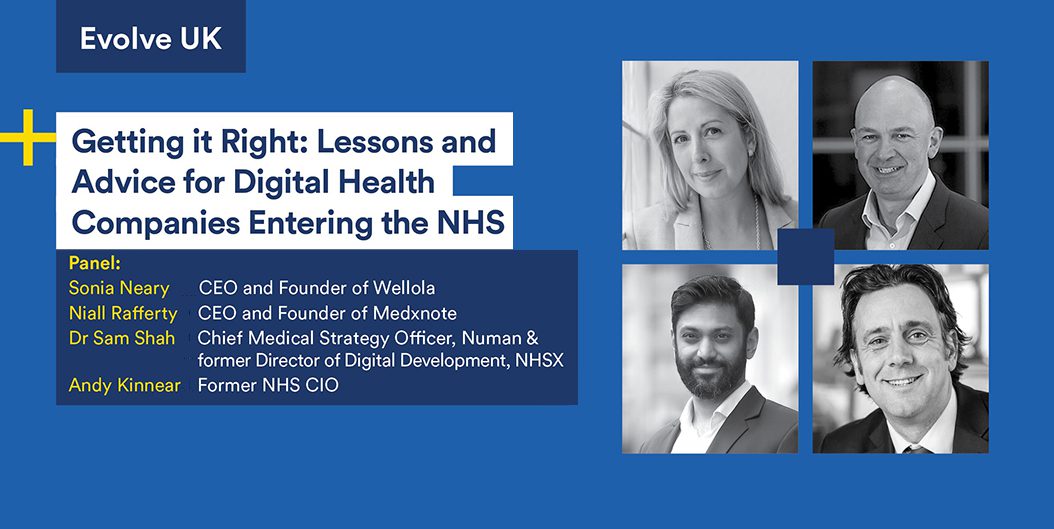
Gender balance, diversity and inclusion is something we strive to promote as much as possible as a society, but in the world of business, having gender balance in a leadership team has been proved to have a very real and positive impact on a company.
As a result, gender balance in management is something that Enterprise Ireland is widely advocating and supporting through a major new initiative, The Level Project.
 The Level Project has its origins in Enterprise Ireland’s Action Plan for Women in Business, which recognised that increasing the number of women in middle and senior management, as well as on boards, leads to more successful, sustainable and profitable businesses. “The Plan saw that there are considerable economic benefits that lie, untapped, in women in their roles both as customers and as talent,” says Sheelagh Daly, Entrepreneurship Manager at Enterprise Ireland. “In essence, by achieving gender balance, a company is tapping into 100% of the talent pool and 100% of the market.”
The Level Project has its origins in Enterprise Ireland’s Action Plan for Women in Business, which recognised that increasing the number of women in middle and senior management, as well as on boards, leads to more successful, sustainable and profitable businesses. “The Plan saw that there are considerable economic benefits that lie, untapped, in women in their roles both as customers and as talent,” says Sheelagh Daly, Entrepreneurship Manager at Enterprise Ireland. “In essence, by achieving gender balance, a company is tapping into 100% of the talent pool and 100% of the market.”
The findings of the report is reflected in numerous studies that show that gender-balanced leadership teams can help businesses grow on a global scale. But despite all these studies and their clear conclusions, Irish companies are a long way from achieving gender balance in senior teams.
There are numerous reasons why, but in the interests of helping companies progress and work towards their own individual gender-balance goals, The Level Project is a practical initiative that includes an online Action Planning Toolkit. Free to all companies, this toolkit helps companies assess their current situation and put in place real actions to enhance gender balance in senior teams.
“Achieving gender balance is certainly harder in some industries than others, but simply taking some steps to enhance the gender balance of your leadership team can have tangible benefits for your business,” explains Sheelagh.
These advantages are already being experienced by four early champions of The Level Project.
VRAI is a fast-growing tech firm in the field of data-driven VR simulation training, and believes that a diversity of mindset is essential to help mitigate the complexity of what they are trying to achieve.
Similarly, Spearline, a leader in telecommunication technology, credits a better understanding of their diverse customer base to diversity within their senior teams.
For CLS, Ireland’s largest contract laboratory, having gender balance throughout the company, especially in leadership teams, creates harmony in the workplace, which can only lead to success.
 However, achieving gender balance is very much a long-term plan for a lot of companies, especially those in industries that are traditionally male dominated. For example, Shannon-based Modular Automation has recognised that gender balance is hard to reach if girls are not seeing engineering as a viable career choice in school – a key part of their strategy is therefore demonstrating the advantages of studying engineering to girls at Junior Cert stage and lower.
However, achieving gender balance is very much a long-term plan for a lot of companies, especially those in industries that are traditionally male dominated. For example, Shannon-based Modular Automation has recognised that gender balance is hard to reach if girls are not seeing engineering as a viable career choice in school – a key part of their strategy is therefore demonstrating the advantages of studying engineering to girls at Junior Cert stage and lower.
A key part of The Level Project is the Action Planning Toolkit, which is suitable for all companies, big and small, whether they are just starting out on their gender balance journey or want to improve and target their efforts even further. The Toolkit consists of six themes (Strategy, Attract, Retain, Develop, Engage, Measure), each of which is divided into two levels according to how advanced a company is. “We recommend that every company should start with the Strategy theme,” explains Sheelagh.
A series of questions is included within each theme; answering ‘No’ to a question presents the user with suggested actions to include in their plan. Each theme also includes links to helpful resources such as guides, templates and expert insights. Once finished, an editable Action Plan for the company can be downloaded, which includes all the actions chosen as well as space for notes.
Enterprise Ireland client companies can also apply for several supports to help develop and implement their gender balance plan. Details of these supports can be found here or by talking to your Development Advisor.
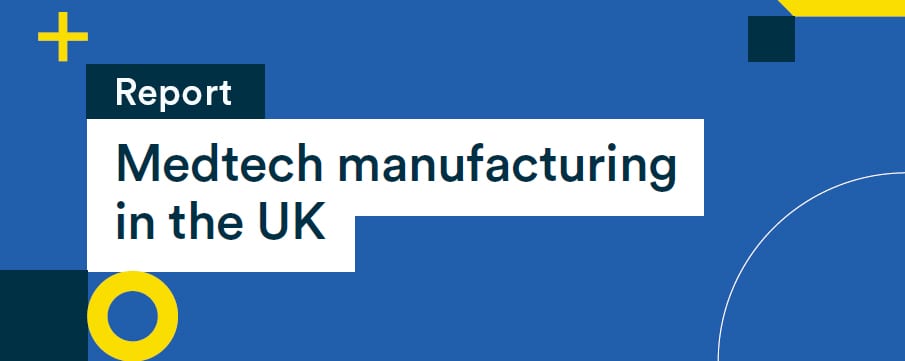
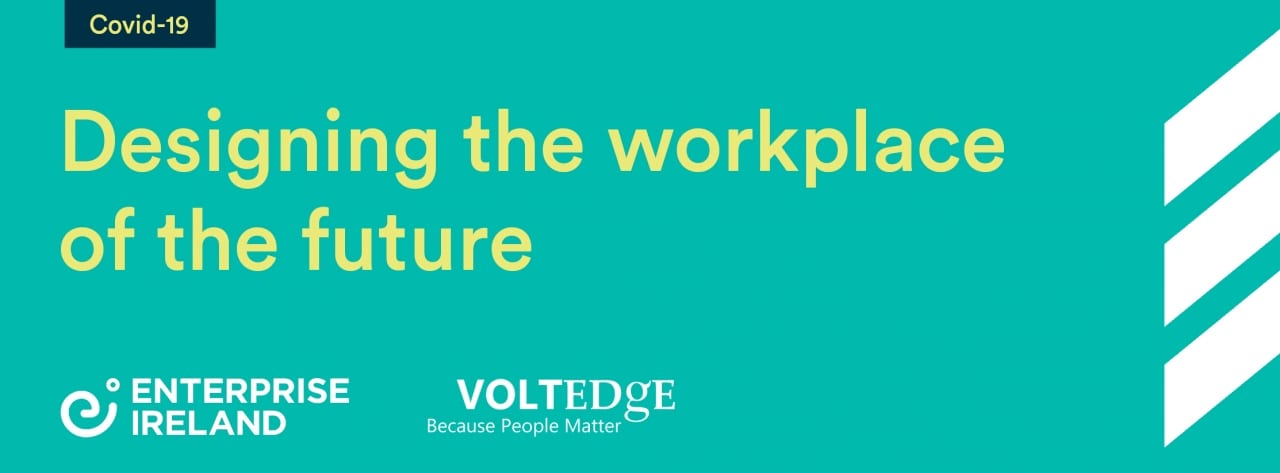
The slow and steady drive towards digitalisation accelerated sharply, and virtual meeting programmes such as Zoom and Microsoft Teams became commonplace. Now, 15 months on, and with the vaccination programme well underway, employers can begin to think about a return to the workplace – hopefully permanently. But the many lessons learned during the pandemic has had both employers and employees thinking about the future workplace – will we ever go back to the way it was? And do we want to?
Enterprise Ireland has produced a new guide, ‘Emerging Through Covid-19 – The future of work’, which aims to help business owners think about the positives and negatives from the last 15 months and to use these to build a sustainable business model for the future. With many employees welcoming the idea of remote working into the future, either full-time or for part of the week, is it time for employers to recognise the positives of remote working and tie it into their company policy on a permanent basis? And if so, how can they make it sustainable?
“This is a follow-on from last year’s Covid-19 employer guide; last year we looked at the health and safety aspects of returning to work, while the theme of this year’s guide is around the future of work,” explains Karen Hernández, Senior Executive, Client Management Development at Enterprise Ireland. “During Covid, the workplace has changed, the nature of work has changed for a lot of people, and what employees expect from their employers has changed. Our aim is for all companies to be prepared to put in place the right structures and practices that suit their business needs and also the needs of their employees.
“A large portion of our client base experienced the need to rush into remote working when Covid-19 hit Ireland in 2020. There have been some advantages and opportunities associated with this; some businesses found they’re as productive, if not more productive when working remotely. This guide aims to help companies take what’s worked well over the last 15 months and create some sustainable practices and processes that work for everybody.”
The guide was developed in partnership with Fredericka Sheppard and Joyce Rigby-Jones of Voltedge, a highly regarded HR consultancy based in Dublin. “The objective with the guide is that it gives you a framework to start developing your own plan for the return to the office,” explains Fredericka. “All organisations are going to have their own dynamic, their own set of circumstances, so there is no one-size-fits-all solution to this. Our aim was to identify key pillars for organisations to use to develop structure and a suitable framework for their business.”
A huge emphasis is placed on the need for communication with employees when making these decisions. “Employers need to engage with and actively listen to their employees, while also driving their business forward,” says Joyce. “This is intended as a broad guide, where employers can pick and choose the relevant pieces to them.”
“It’s very important that employees feel that they’re being heard,” adds Fredericka. “However, decisions need to be made based on a number of factors, and employee input is just one of those factors. Obviously it’s really important to manage expectations and sometimes it’s just down to how you ask the questions. Give them some context from a business point of view. It’s not just about the employees’ wish-list, it’s also about creating a sustainable workplace for the future.”
Many employers are looking at keeping some sort of remote or flexible working practices in place – and offering this flexibility can be very positive when it comes to attracting talent. “Almost two-thirds of our client base are saying they find it hard to attract, engage and retain talent,” says Karen. “Companies need to consult and stay close to their employees and ask them what they want – and include aspects like flexibility as part of a value proposition to attract candidates.
“Many companies that we are working with are looking at some sort of hybrid model, where employees combine time working in the office and time spent working remotely, at home or in co-working spaces. There are huge upsides, such as accessing skills from different parts of the country that they never would have before – offering remote, flexible or hybrid working is attractive to employees.
However, this can be difficult to manage, and companies need to consider what works for the team as a whole as well as what’s right for individuals within those teams.”
“There’s a big need for management support and training, especially for middle and line managers and supervisors who are dealing with a remote workforce,” explains Joyce. “It’s difficult for them, but it’s important that they get it right. Ensuring your managers are confident in what they do, and in their engagement with their teams. We are hearing that companies are looking to bring their employees into the office more, but it’s about getting that blend right between remote working and the office. One aspect that we emphasised in the guide is the need to make sure you are not discriminating against employees who are not in the office environment.”
Identifying and managing issues such as burn-out and isolation is essential if companies are to offer some sort of remote working policy. “Companies that have regular check-ins and meetings with staff and use different methods of communication, such as video calls, emails and direct messaging are more likely to keep employees engaged when working remotely. It’s also important for employees to have individual focus time, where they are able to detach from colleagues and concentrate on getting their work done without interruption”, says Karen. “Long term, we don’t know enough about hybrid working for a definite ‘best practice’ but instead companies should pilot different ways of working – for instance, we have some companies who are trialling a ‘team days’ concept – having the whole team in for certain days of the week, then for the rest of the week, they’re working from home.”
The aim of the guide is to pose those broad questions that will help employers in every sector decide on the right workplace for the future of their business – but there is no need to rush into a decision. “The biggest challenge for employers is making the decision as to how you’re going to handle this working environment,” says Joyce. “Are you going to fully return, are you going for a hybrid, can you facilitate a full return in the workspace that you have? Employers need to make very big decisions, and very strategic, long-term decisions, so we’re suggesting that they talk to their employees about what they want and then piloting whatever they plan to do before they make any strategic decisions that will impact on the business going forward.”
Covid-19 has had a huge effect on how we work – but now is the time to use what we have learned since March 2020 to create a more inclusive, sustainable business model, one that pushes the business forward while creating a culture that values employees and their health and wellbeing more than ever before. This can only be a positive thing.
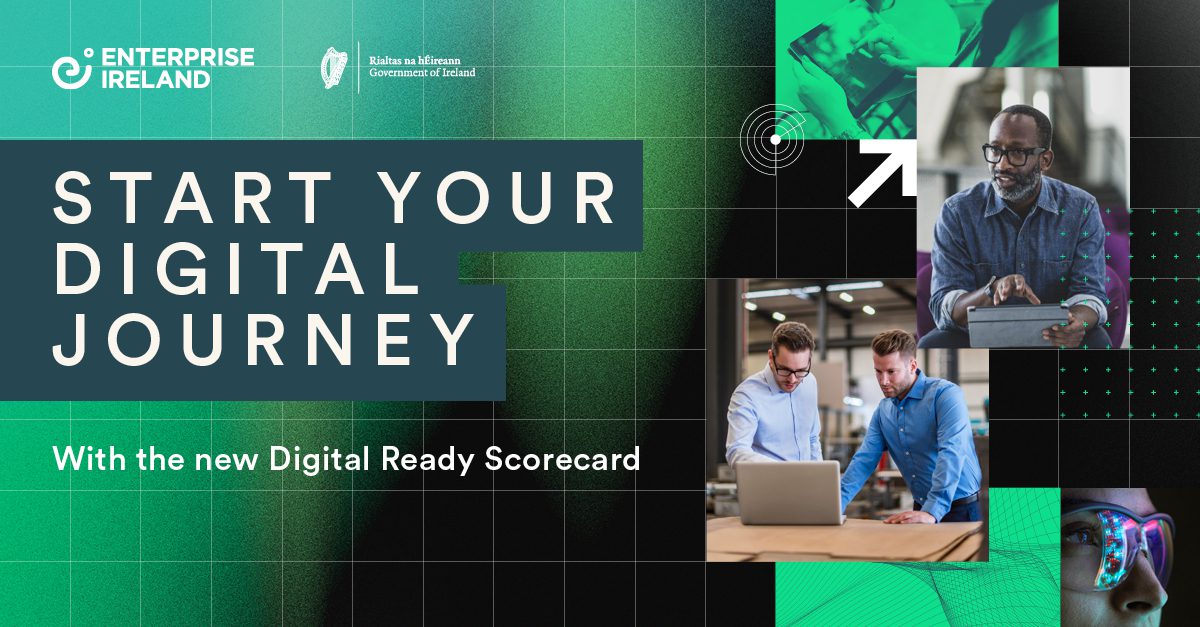
During this period of recovery, Irish companies are looking at every way possible to grow and increase their business. While finding new markets for your offerings is an important strategy, the role that digital transformation can play in business growth cannot be underestimated. According to the World Economic Forum, over $3.1 trillion in productivity gains could be added to the global economy by digital initiatives by 2025.
To ensure they share in these gains, Irish businesses are primed to drive their digital transformation strategies but it’s important that they take a holistic approach so their digital plan can evolve as the business grows.
“Most Irish companies are somewhere along the digital maturity curve,” says Conor O’Donovan, Head of Marketing Communications and the Client Digitalisation Unit at Enterprise Ireland. “Some are at the very early stage, which means they have only begun to look at ways to optimise their business through moving to the cloud for example, or implementing a CRM to improve how they engage and record customer data and interactions. Other companies are further along the journey, and are embedding automation to streamline manual repetitive tasks, while others are adopting data analytics and AI into to improve data analysis and predicting trends that impact their businesses and providing real time customer or supplier information upon which they can make informed decisions.”
While the advantages of adopting a robust a robust digital plan are clear and plentiful, there are challenges facing SMEs. “Knowledge and awareness are key issues,” explains Conor.
“Ensuring that these skills are available to the business either internally or externally are key success factors, as is developing a digital mindset across the business. Finally, the availability of finance can be a key challenge in implementing the right solutions.”
Many businesses mistakenly believe that digitalisation is just about expensive technology, but this is only part of the story. According to Conor, there are four key aspects to a successful digital strategy, all of which need carefully addressing.
“Firstly, ask yourself why you need a digital strategy. It’s easy to read about a new platform or technology solution but a good digital strategy must be aligned to your business strategy. Ask yourself a number of key questions. For example, what business objective can be enabled by the digital plan? Is it about finding new customers or increasing sales with existing ones? Is it about improving production efficiencies or about strategic decision-making, which requires the availability of real-time accurate information drawing from several business units or locations? These are all important questions that must be answered before you start.
“The second key factor is process. It is hugely important to review and optimise processes before layering on digital technologies. An inefficient process before digital will remain an inefficient process after digital. Talk to Enterprise Ireland and the Local Enterprise Offices for help on this; we have LEAN programmes to support process optimisation.
“It must be driven by multiple people across the organisation and developing a digital culture and mindset across the business is key. There are multiple programmes on digital available from Skillsnet, the IMI and others to support this.
“Then finally we get to the technology piece. This part can be daunting for companies with limited budget, so it’s vital to take the time to really assess the technology required. It’s also important to ensure interoperability as new technology comes on stream as part of a multi-year plan – so the technology ‘speaks to each other’. This will avoid expensive integration and data extraction issues at a future date.”
While the above might feel daunting, especially for businesses at an early stage in their digital journey, there is plenty of help available. Enterprise Ireland can help Irish exporting businesses to focus on and develop their digital strategy. The new Digital Ready Scorecard is a short self-assessment online tool that enables businesses to assess their current digital readiness and identify any gaps. The scorecard also signposts supports from Enterprise Ireland, the Local Enterprise Offices and across Government. More information can be found on the Enterprise Ireland website.
Enterprise Ireland also offers a €9k fully funded Digitalisation Voucher for eligible companies to engage independent experts to develop their digital strategies before purchasing any technology. All these aids will ensure that Irish exporters can reap the significant rewards of a robust and dynamic digital strategy.
The saying that ‘knowledge is power’ is certainly true of successful exporting. Companies must use market intelligence to understand their customers’ requirements, cultural considerations, market trends and what competitors are doing, in order to succeed.
Insights gained from high-quality market research are essential for good business decisions for companies with the ambition to grow, export and, indeed, survive. While successful products and services are built on sound market research, a continual process of keeping up-to-date with business intelligence is required, which can be time-consuming and costly.
That is one reason Enterprise Ireland’s Market Research Centre is such a valuable resource. It is the largest repository of business intelligence in Ireland and contains thousands of world-class market research insights, available to Enterprise Ireland supported companies.
Reports include company, sector, market and country information, which help businesses to explore opportunities and compete in international markets. We use databases from blue-chip information providers such as Gartner, Frost & Sullivan, Mintel and others, which provide authoritative, verified information that is independent and reliable. Some of these reports cost tens of thousands of euro individually, so the value of accessing the service is immense.
The Market Research Centre is staffed by information specialists who help clients locate the most appropriate sources of knowledge for their requirements. The specialists can track down niche market intelligence that is not available through internet research and can also facilitate access to industry analysts to provide bespoke briefings that deep-dive into subject areas.
While the UK and European markets remain vitally important for exporters, increasingly diversification into more distant markets is a strategic option. Critical to all such business decisions is access to authoritative market research.
An example of how the centre helps companies to explore opportunities in overseas markets is workforce travel company Roomex. Over the last two years, the company has targeted the UK and Germany and is now looking at the huge potential of the US market. Information specialists helped the company gain valuable insights by providing access to global company, country, market and sector data which helped the Roomex to analyse their target customer and competitor base.
Enterprise Ireland’s research hub offers access to extensive predictive research on future trends, which is invaluable for companies interested in innovation. Knowledge of what might impact a market next provides an opportunity to develop new products or solutions. There are huge opportunities arising from disruptive technologies, such as driver-less cars, but also risks to companies which are not looking ahead.
Companies which are serious about exporting, growing and future-proofing their business should put continuous research at the heart of their strategy.
If your company is considering expanding into new markets the Market Research Centre’s extensive resources and expertise should be your first port of call.